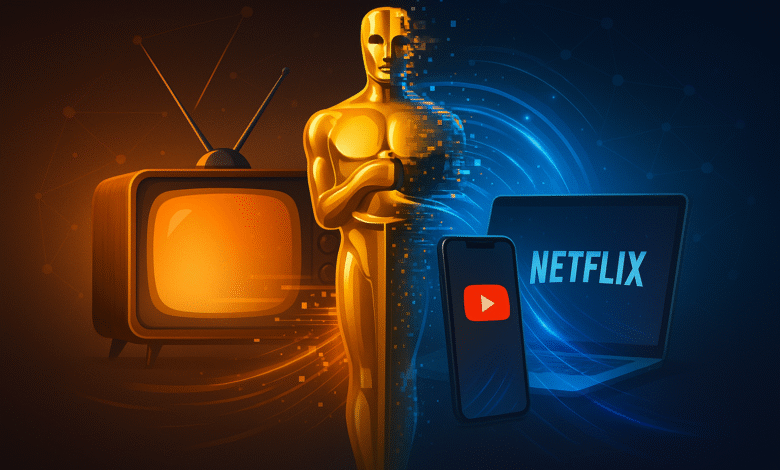Now You Could Streaming the Oscars on YouTube or Netflix by 2029
Discover how YouTube, Netflix, and streaming platforms could broadcast the Oscars after 2029. Learn about declining TV ratings, rights negotiations, and the future of award shows.

For nearly five decades, the Academy Awards have been synonymous with ABC television. Since 1976, ABC has held the exclusive broadcast rights to what many consider Hollywood’s most glamorous night. But that’s about to change. As of 2029, the Oscars streaming future could look radically different thanks to a series of high-stakes negotiations happening behind the scenes. Major streaming platforms including YouTube, Netflix, and even Amazon are actively positioning themselves to become the next home of the Academy Awards when ABC’s current contract expires in 2028.
This shift isn’t happening in a vacuum. The traditional television industry is facing unprecedented pressure as cord-cutting accelerates and younger audiences abandon cable in droves. Meanwhile, award show viewership has plummeted to historic lows. The 2024 Oscars attracted just 19.7 million viewers—a fraction of the 50+ million audiences from the 1990s. For an event that was once the gold standard of live television, these numbers spell trouble. The Academy knows it needs to meet viewers where they are, and increasingly, that’s on streaming platforms, not broadcast networks.
What does this mean for how you’ll watch the Academy Awards in the coming years? Will you need a Netflix subscription? Could the ceremony go free on YouTube? Will the Oscars remain exclusively with ABC, or could they finally embrace the streaming era? These questions are at the heart of one of entertainment’s biggest business stories, and the answers could reshape how we consume live events for years to come. This article explores the current state of Oscars broadcast negotiations, the role of YouTube and Netflix in the bidding war, and what the future of award show television actually looks like.
EXPLORE THE CONTENTS
Why the Oscars Are Up for Grabs in 2029
The End of an Era: ABC’s Expiring Contract
ABC has enjoyed an extraordinarily long relationship with the Oscars. Since taking over broadcasts in 1976 (after NBC handled the ceremonies from 1953 to 1970), the network has built the Academy Awards into a cultural phenomenon. The ABC and Oscars partnership has lasted nearly five decades, making it one of Hollywood’s most enduring professional relationships. However, all good things must end. ABC’s current broadcasting rights agreement expires in 2028, marking the end of an era and opening the door for significant changes to how the world watches the ceremony.
The Academy extended ABC’s contract through 2028 in a 2016 agreement that initially seemed locked in for the long haul. But the entertainment landscape has shifted dramatically since then. Streaming services have become dominant distribution channels. Viewership patterns have fundamentally changed. And the Academy is now exploring whether staying with traditional broadcast television makes business sense anymore. For the first time in decades, serious questions are being asked about where the Oscars should call home after 2029.
Declining Viewership and the Crisis in Awards Show Television
One of the biggest drivers pushing the Academy toward change is simple mathematics: fewer people are watching awards shows on traditional television. The Oscars ratings decline has been staggering. In the 1990s, award ceremonies regularly pulled in 50 million or more viewers. By 2024, that number had dropped to 19.7 million—less than 40 percent of its peak audience. The trend has been consistently downward for years, and network executives are running out of explanations.
This isn’t unique to the Oscars. The Emmy Awards, the Golden Globes, and other major ceremonies have all experienced similar drops. The culprits are well understood: cord-cutting is accelerating, traditional TV viewership skews older, and younger audiences have abandoned cable in favor of on-demand streaming. Live awards shows represent one of the last bastions of appointment television, but even that fortress is crumbling.
For the Academy, the low numbers create a paradox. On one hand, the ceremony remains one of television’s biggest annual events—19.7 million viewers still represents significant reach. On the other hand, the trajectory is concerning. Networks and streaming platforms alike are questioning whether the current broadcast model generates sufficient value. This uncertainty is precisely what’s prompting the Academy to consider alternatives.
YouTube and Netflix: The Major Bidders for Oscars Rights
YouTube’s Play for Premium Live Events
YouTube streaming the Oscars isn’t merely speculation—it’s an active negotiation. According to Bloomberg reporting, Google’s YouTube has officially contacted the Academy of Motion Picture Arts and Sciences to inquire about acquiring broadcast rights to the Oscars starting in 2029. This represents a significant strategic pivot for YouTube, which has traditionally been seen as a platform for user-generated content rather than premium televised events.
However, YouTube has been aggressively pursuing marquee live events in recent years. The platform successfully negotiated to stream NFL Sunday Ticket starting in 2023, drawing millions of viewers and establishing YouTube as a serious contender for premium content rights. More recently, YouTube announced plans to broadcast a live NFL game between the Los Angeles Chargers and Kansas City Chiefs during the 2025 season. These moves demonstrate that YouTube is serious about competing for high-profile, appointment television content.
For the Academy, YouTube presents several advantages. The platform reaches a global audience that dwarfs traditional television’s reach. YouTube’s interactive capabilities could enable viewer engagement features that ABC simply cannot offer—things like behind-the-scenes feeds, interactive voting, and real-time social integration. Additionally, YouTube’s advertising infrastructure is sophisticated enough to generate substantial revenue, likely exceeding the $75 million annual fee that ABC currently pays.
However, YouTube also has limitations. While it leads in total streaming minutes watched, it lacks the broadcast infrastructure that networks like ABC and NBC possess. There are also technical concerns about streaming reliability for live events. When Hulu’s live streaming of the Oscars faltered during 2024, it underscored the technical challenges inherent in moving awards shows to digital platforms.
Netflix’s Expanding Role in Live Entertainment
Netflix and the Oscars represent another fascinating possibility. Netflix has demonstrated growing interest in live events and has already made significant inroads into awards show territory. The streaming giant acquired the rights to the SAG Awards (Screen Actors Guild Awards) starting in 2024, making it a player in the awards broadcast space. Netflix is also investing heavily in live comedy specials, sporting events, and other real-time content.
Several factors make Netflix a natural bidder for Oscars streaming rights. First, Netflix has a massive subscriber base approaching 200 million accounts globally. Second, the company has proven its ability to produce and distribute high-quality content. Third, Netflix’s history of producing Oscar-nominated films gives it credibility within Hollywood—the Academy views Netflix not just as a distributor but as a content creator and stakeholder in the industry.
From Netflix’s perspective, acquiring the Oscars would be transformative. The ceremony would serve as a marquee event that could drive new subscriptions, boost engagement among existing subscribers, and position Netflix as the platform for premium entertainment events. However, Netflix’s subscription model raises questions about accessibility. Would watching the Oscars on Netflix require a paid subscription, potentially alienating casual viewers who simply want to tune into Oscar night?
Other Contenders: Amazon, NBC, and the Multi-Platform Strategy
While YouTube and Netflix are the most high-profile bidders, they’re not alone in the running. Amazon Prime Video has expressed preliminary interest. NBCUniversal (which is a competitor but also partly owned by Comcast, which has its own streaming ambitions) hasn’t ruled itself out. Even CBS, which previously broadcast the Oscars decades ago, could theoretically re-enter the picture.
Some industry analysts believe the Academy might ultimately pursue a multi-platform distribution strategy similar to what professional sports leagues now employ. Rather than granting exclusive rights to a single entity, the ceremony could be split across multiple platforms. For instance, ABC could retain a broadcast component while YouTube or Netflix gains streaming exclusivity. The SAG Awards model with Netflix demonstrates that this approach is feasible.
This possibility actually appeals to the Academy because it maximizes total viewership and revenue. No single platform—streaming or traditional—would have to bear the entire rights fee burden, and the ceremony would remain accessible to the broadest possible audience regardless of platform preference.
Key Considerations in the 2029 Negotiations
Subscription Access vs. Free Streaming
One of the thorniest questions in Oscars broadcasting negotiations involves subscription requirements. If Netflix acquires the rights, would viewers need active subscriptions to watch the ceremony? Netflix’s ad-supported tier (launched in 2022) complicates matters further. Would the Oscars air on Netflix’s ad-supported tier, free tier, or exclusively on the premium subscription tier?
YouTube faces the opposite problem. The platform is free to anyone with an account, but it generates revenue through advertising. This means the Oscars could potentially air for free, which sounds appealing until you consider that an ad-supported broadcast generates far less revenue than what ABC currently provides. YouTube would need to charge something or substantially increase ad inventory, neither of which is guaranteed to be approved by the Academy.
For the Academy, the decision hinges on a delicate balance. The organization wants to maximize viewership and maintain the Oscars’ status as a cultural touchstone available to everyone. Simultaneously, it wants to secure the highest possible broadcasting rights fee to fund its operations and capital projects. These goals sometimes conflict.
Technical Reliability and Live Event Infrastructure
The 2024 Hulu Oscars stream disruption serves as a cautionary tale. When the live streaming of that year’s ceremony failed, it reminded the entertainment industry that streaming infrastructure, while sophisticated, isn’t yet as bulletproof as traditional broadcast television. For an event watched by billions worldwide and orchestrated with military precision, technical failure isn’t an option.
Any streaming platform bidding for the Oscars would need to demonstrate robust infrastructure capable of handling simultaneous viewership that could spike to 20 million or more during peak moments. They’d need redundant systems, failsafe protocols, and the ability to maintain broadcast quality across multiple devices and international markets. YouTube and Netflix both have data center infrastructure at that scale, but deploying it for a live event creates unique challenges.
Global Reach and International Distribution
The Oscars broadcast in more than 225 countries and territories worldwide. Global reach is non-negotiable for any platform wanting to acquire the rights. YouTube’s global accessibility is nearly universal, though internet speeds and streaming capability vary dramatically by region. Netflix’s international footprint is also substantial but slightly more variable depending on specific country partnerships and licensing arrangements.
Traditional broadcast networks have established international distribution networks developed over decades. ABC sells overseas rights to the Oscars across Europe, Asia, and other regions, generating additional revenue. A new streaming platform would either need to establish similar international relationships or convince the Academy that global streaming delivery alone is sufficient.
How This Affects You: The Viewing Experience by 2029
Interactive Features and Engagement
If the Oscars move to YouTube or Netflix, the viewing experience could change dramatically. Streaming platforms have capabilities that traditional broadcast television simply doesn’t possess. Imagine interactive voting where you choose your favorite dress on the red carpet. Picture multiple camera angles available simultaneously, letting you focus on specific parts of the stage. Consider live commentary options or behind-the-scenes access available in real-time.
Netflix, in particular, has experimented with choose-your-own-adventure content and interactive experiences. YouTube has established infrastructure for live chat and community engagement. The Oscars on either platform could look fundamentally different from the ABC broadcast you’re accustomed to—not necessarily better or worse, just different.
Accessibility and Where You Can Watch
The biggest variable affecting viewers is where the ceremony will be available. If Netflix acquires exclusive rights, non-subscribers would need to activate an account (possibly using a free trial or ad-supported tier) to watch. If YouTube wins, viewers could likely watch free with ads or potentially ad-free if they have YouTube Premium subscriptions. If ABC retains rights or co-broadcasts, the traditional cable experience continues largely unchanged.
For cord-cutters and younger audiences, moving to a streaming platform is actually preferable. For older viewers or those without streaming subscriptions, it could present barriers. This tension sits at the heart of the Academy’s decision-making process.
Industry Precedent: How Other Awards Shows Are Adapting
The Grammy Awards’ Hybrid Approach
In a significant move, the Grammy Awards will shift to Disney’s ABC network and streaming platforms starting in 2027. Disney won a 10-year deal taking the Grammys from their previous home on CBS. Importantly, the Grammys will air simultaneously on both traditional broadcast (ABC) and streaming (Hulu and Disney+). This represents a hybrid broadcasting model that might serve as template for the Oscars.
The Grammy precedent suggests the Academy might avoid an either-or choice between broadcast and streaming. Instead, simultaneous broadcast and streaming could satisfy both traditional viewers and the cord-cutting demographic.
The SAG Awards and Netflix’s Awards Show Role
When Netflix acquired rights to the SAG Awards starting in 2024, it represented a watershed moment. For the first time, a major awards ceremony was exclusive to streaming. While the SAG Awards have smaller viewership than the Oscars (typically 3-4 million viewers), the Netflix deal validated the model that streaming platforms could handle major ceremonies.
Netflix’s management of the SAG Awards—handling production challenges, managing commercials, and maintaining production quality—demonstrated capability. If Netflix successfully executes its SAG Awards responsibilities, it strengthens its case for hosting the Oscars.
What Could Go Wrong: Challenges and Risks
Technical Failures and Broadcast Reliability
Live streaming is susceptible to technical glitches that would be unacceptable for an event of the Oscars’ magnitude. Internet congestion, server failures, cyberattacks, or encoding errors could disrupt global viewership. While streaming technology has matured considerably, the stakes for the Oscars are extraordinarily high. Even a 10-minute outage during the Best Picture announcement would constitute a catastrophic failure.
Lower Viewership If Paywalled
If the Oscars move behind a paywall (whether Netflix subscription or premium YouTube tier), viewership will likely decline. Some casual viewers would simply opt not to watch rather than pay. This presents a dilemma: streaming platforms need subscription revenue to justify massive rights fees, but the Academy might not want to sacrifice the “cultural event” status that depends on broad accessibility.
Loss of Advertising Revenue
Traditional broadcast networks generate enormous revenue through commercial advertising. ABC typically sells Oscars commercial spots for $1.5-2 million per 30-second slot. Streaming’s ad model operates differently, typically generating less per viewer. Unless a streaming platform can maintain equivalent ad rates (which seems unlikely), total revenue might not match what ABC currently pays.
The Reliability Question: Why ABC Might Win Again
Despite all the talk of streaming takeover, ABC (owned by Disney, which also owns Hulu and Disney+) remains a formidable competitor. ABC has unmatched broadcast infrastructure, proven ability to execute complex live events, and the legitimacy of tradition. The network has successfully broadcast the Oscars for nearly 50 years. Many in the Academy might view staying with ABC as the “safe choice” despite industry pressure to modernize.
Predictions: What Will Actually Happen by 2029?
Most industry observers anticipate one of three scenarios:
Scenario 1: Hybrid Multi-Platform Deal The Academy pursues something like the Grammy Awards model—simultaneous broadcast on ABC and streaming on Hulu, Disney+, or another platform. This maximizes viewership while generating robust revenue from both traditional and streaming sources. This seems most likely given industry trends and the Grammy precedent.
Scenario 2: YouTube Exclusive YouTube successfully bids for exclusive rights by offering a substantial rights fee, and the ceremony goes free or ad-supported on YouTube. This appeals to younger audiences and aligns with cultural shifts. Technical reliability would be critical.
Scenario 3: Netflix Premium Event Netflix acquires exclusive rights and broadcasts to all subscribers (across both ad-supported and premium tiers). SAG Awards success makes this plausible, though it risks alienating viewers unwilling to subscribe.
Scenario 4: ABC Retains Rights Despite industry pressure, ABC successfully retains broadcast rights by offering a competitive rights fee and embracing streaming integration. Tradition and proven reliability win out over innovation.
Industry consensus slightly favors a multi-platform approach, but genuine uncertainty remains. According to reporting from Deadline, the Academy will likely begin formal negotiations in 2026, so major announcements could come within the next 18 months.
The Bigger Picture: Why This Matters
The Oscars broadcast rights negotiation isn’t just about one awards show. It’s a bellwether for the entire entertainment industry. How the Academy handles this transition will influence decisions at the Grammy Awards, Emmy Awards, Tony Awards, and every other televised event competing for viewers’ attention.
The core question is this: Do prestigious cultural moments need to be accessible to everyone on traditional platforms, or is reaching younger, streaming-native audiences worth potentially fragmenting the audience? The answer will shape how entertainment companies approach distribution for the next decade.
For viewers, the outcome determines how you’ll celebrate cinema’s biggest night in 2029 and beyond. Will you gather around a television watching ABC? Will you open Netflix? Will you stream free on YouTube? Will some viewers do each? That answer remains gloriously uncertain, which is exactly why the 2029 Oscars broadcasting future continues to captivate industry watchers.
Conclusion
The Academy Awards are entering a new era. With ABC’s broadcast rights expiring in 2028, YouTube, Netflix, Amazon, and other major platforms are aggressively bidding to become the home of the Oscars starting in 2029. While the outcome remains uncertain, one thing is clear: the days of the ceremony being exclusively available on traditional broadcast television are numbered.
Whether the Academy opts for a multi-platform hybrid model, grants exclusive rights to a streaming giant, or makes another choice entirely, the future of Oscars broadcasting will reflect broader transformations in how people consume entertainment.
The ceremony that has celebrated cinema for nearly a century will continue to evolve with the times, meeting audiences wherever they choose to watch. As negotiations intensify and formal bidding looms, the coming months will prove crucial in determining not just where you’ll watch the 2029 Oscars, but how the entire entertainment industry manages its transition from traditional broadcast to streaming dominance.







